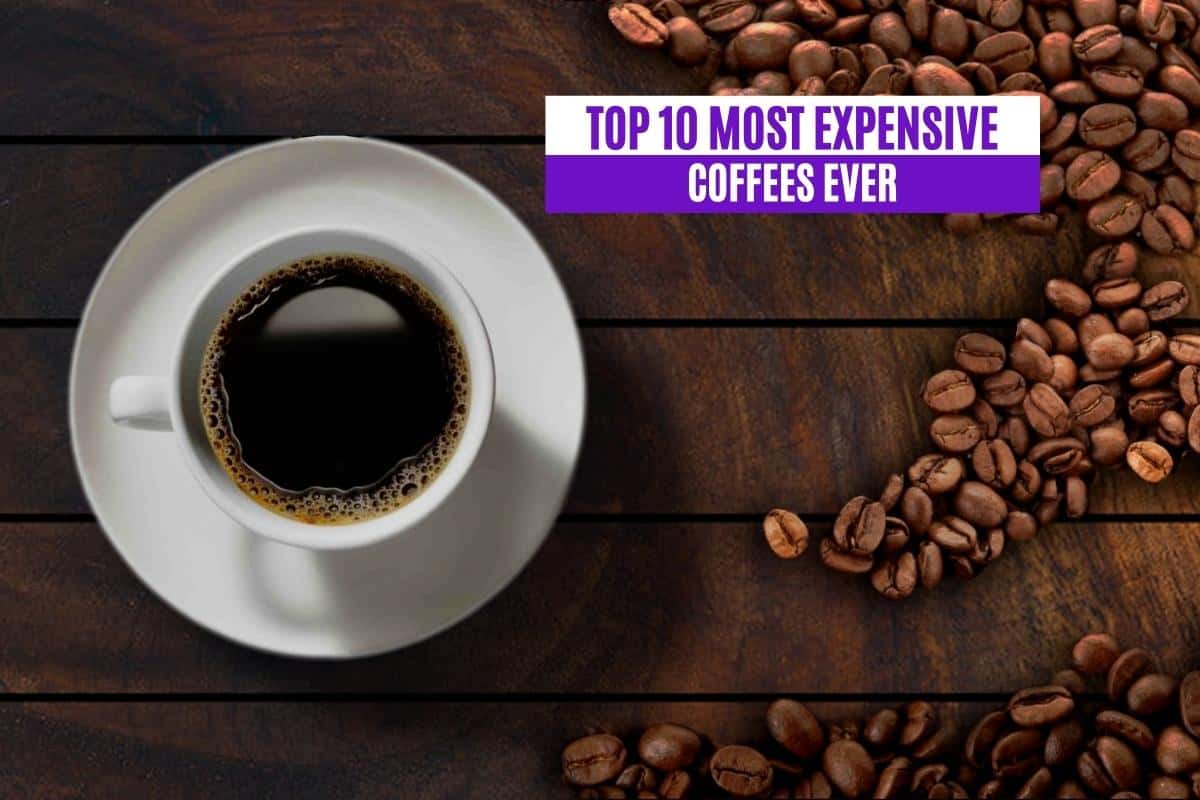There’s nothing quite like a fresh cup of coffee in the morning to wake you up and help you start your day. But while most home-brewed coffees are quite affordable, some cost hundreds or thousands of dollars per pound. Which of these decadent coffees is the most expensive?
The most expensive coffee is Black Ivory, a rare gourmet coffee served at only the finest restaurants and hotels. This coffee is unique because it’s refined by elephants and is only available in small quantities. It has a unique flavor that’s often described as sweet and chocolatey.
If you’re eager to try a sip of some of the most expensive cups of joe on the planet, this ranking can help you select a high-priced option that suits your tastes.
Here Are the Top 10 Most Expensive Coffees Ever:
- Black Ivory – $1,685 per pound
- Ospina Dynasty – $1,431 per pound
- Cafés Granell Wild Kopi Luwak Coffee – $1,100 per pound
- Luwak Star Gourmet Sumatra Gayo Luwak Coffee – $471 per pound
- Free Range Kopi Luwak – $450 per pound
- Jamaican Blue Mountain Peaberry Coffee – $150 per pound
- Hacienda La Esmeralda Panama Geisha – $75 per pound
- El Injerto Legendary Geisha – $68 per pound
- Mountain Thunder Coffee Plantation Kona Coffee – $65 per pound
- Big Island Kona Peaberry – $59 per pound
10. Big Island Kona Peaberry – $59 Per Pound
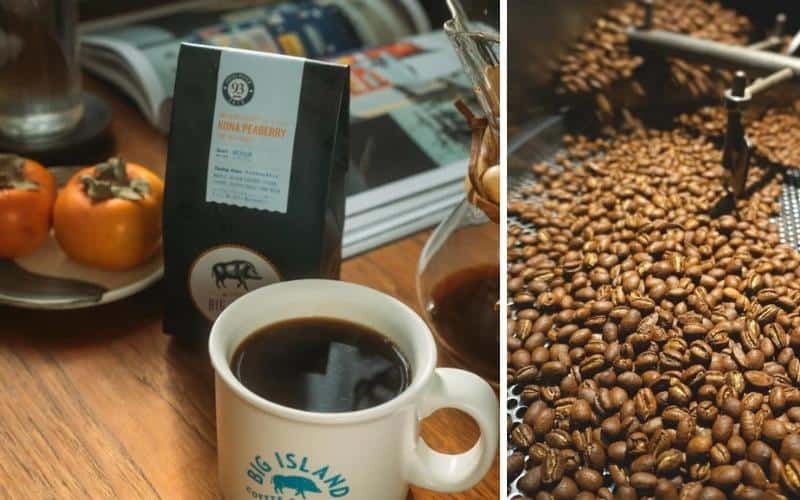
Big Island is a relatively new Hawaiian brand founded in 2010. Though they offer several varieties of island-grown coffee, their priciest is Big Island Kona Peaberry, which costs $59 per pound.
Unlike other types of gourmet coffee (many of which are only available as whole beans), you can select from whole bean, drip, or French press grinds to suit your coffee-making preferences.
But convenience isn’t the main reason behind this coffee’s higher-than-average price.
Why It’s Expensive
This coffee is expensive due to its palate-pleasing flavor and comparative rarity.
Kona Peaberry enjoys stellar consumer ratings and has a point rating of 93. Its flavor notes include cinnamon and plum, making it a sweet alternative to common bitter brews.
Additionally, because Big Island is a small company, its supply of coffee is comparatively small. This low supply results in higher prices, especially as demand for this brand’s delicious cups of coffee increases.
9. Mountain Thunder Coffee Plantation Kona Coffee – $65 Per Pound
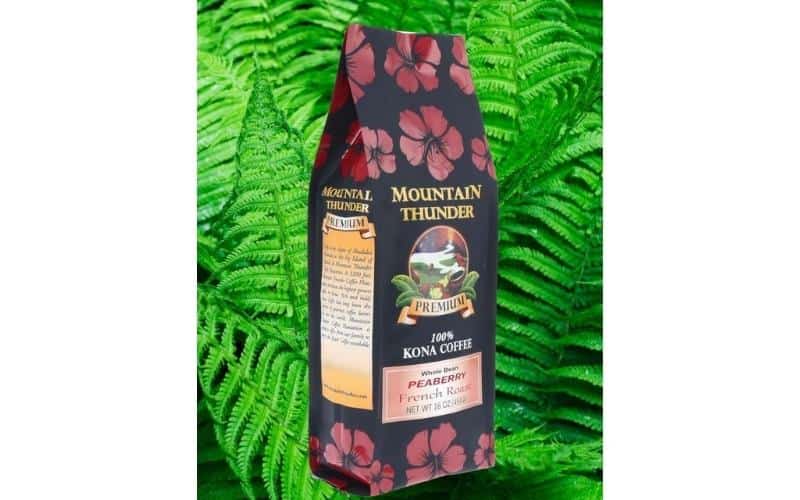
Like Big Island, Mountain Thunder Coffee Plantation is located in Hawaii. However, this company was founded in 1998, making it a slightly more established option.
Mountain Thunder Coffee Plantation oversees fewer than 4,000 acres of land, producing its coffees in small batches. This smaller supply level makes this coffee far pricier, and Mountain Thunder Kona Peaberry Coffee costs about $65 per pound.
But is this Hawaiian coffee worth such a steep price?
Why It’s Expensive
This coffee commands a high price due to its exceptional flavor and scarcity. Labor costs are also something to consider, as producing coffee in Hawaii is an expensive task.
8. El Injerto Legendary Geisha – $68 Per Pound
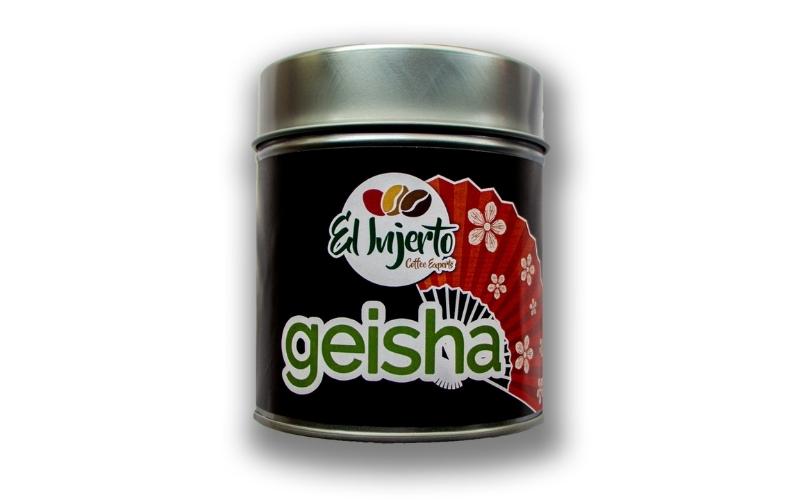
One of South America’s most significant exports is coffee, as these plants tend to thrive in the mountainous regions found throughout the South American continent.
But of all the countries in South America, Guatemala might produce some of the priciest beans. After all, this country is home to El Injerto, a popular brand of African-style coffee that fetches high prices.
For example, a single 7.05-ounce container of El Injerto Legendary Geisha costs $29.90, which works out to $68 per pound!
A cup of Finca El Injerto goes great with a plate of fresh fruit or cheese. For an exquisitely rich experience, consider pairing this coffee with some of the world’s most expensive cheeses.
Why It’s Expensive
El Injerto Coffee is expensive because it’s an imported product. Those living outside of Guatemala must pay higher prices to enjoy this coffee, as shipping costs and importation fees are often tacked onto the final retail price.
7. Hacienda La Esmeralda Panama Geisha – $75 Per Pound
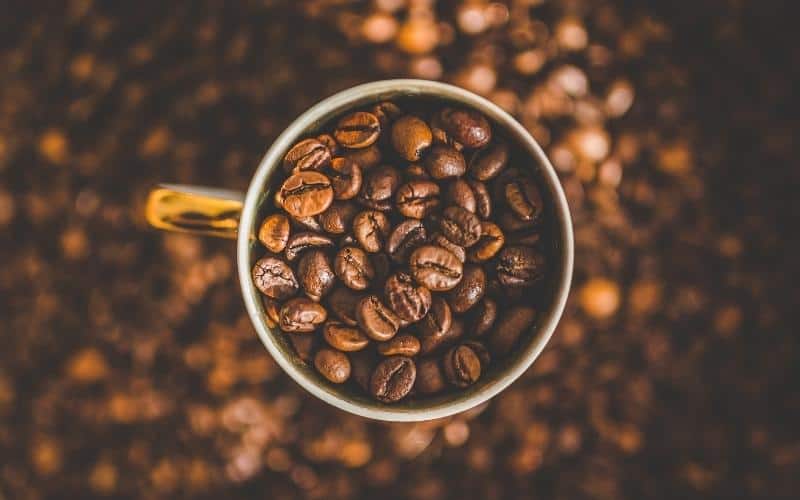
Hacienda La Esmeralda is so exclusive that interested buyers can only order coffee by personally contacting the company or purchasing bags from third-party online retailers.
So it should be no surprise that their bags of beans are unusually expensive, with some varieties (like Panama Geisha Coffee) costing up to $75 per pound.
Why It’s Expensive
Though Hacienda La Esmeralda operates three farms, making them slightly larger than other gourmet coffee producers, they’re still considered a small company. As such, the amount of coffee they produce each year is limited.
But scarcity isn’t the primary reason behind this brand’s high prices.
Instead, it’s their dedication to sustainable farming and fair employee pay. These ethical practices result in a higher price for consumers, but this trade-off may be well worth it, especially for those looking to enjoy a cup of guilt-free coffee.
6. Jamaican Blue Mountain Peaberry Coffee – $150 Per Pound
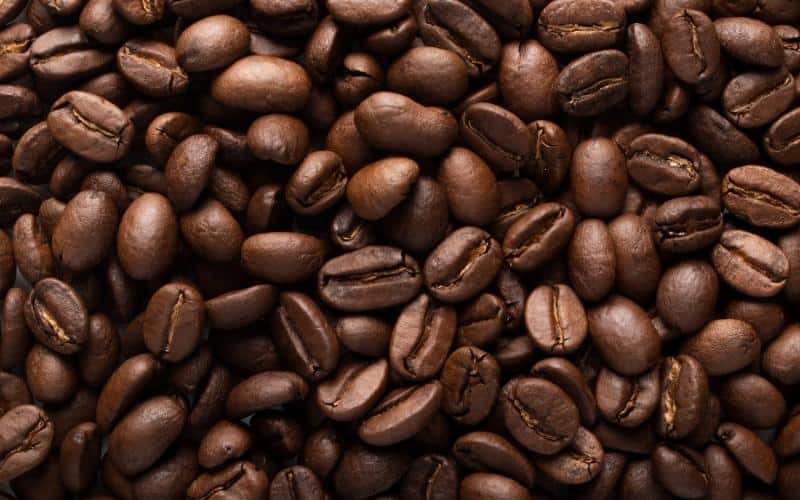
Though tons of gourmet coffees fall into the $50 to $100 range, only a select handful retail for more, including Jamaican Blue Mountain Peaberry Coffee.
Like other peaberry coffees, this variety is celebrated for its sweetness, noticeable lack of bitterness, and smooth, grit-free texture. But at $150 per pound, the smooth, chocolatey flavor might not be incentive enough for some coffee drinkers.
Why It’s Expensive
This coffee is expensive because it’s made using rare peaberry coffee beans. This makes Volcanica’s Jamaican Blue Mountain Peaberry Coffee rare, naturally increasing its value. This coffee is also a product of Jamaica, so importation fees may play a role in pricing.
5. Free Range Kopi Luwak – $450 Per Pound

Though Free Range Kopi Luwak isn’t produced in Jamaica, it’s yet another gourmet coffee available via Volcanica Coffee, a Georgia-based company providing North Americans with rare and exquisite coffees.
That said, this coffee is $300 costlier than Jamaican Blue Mountain Peaberry, with a price-per-pound of $450!
Like other Kopi Luwak coffees, this product is made by feeding coffee fruits (also called cherries) to civets, which are cat-like creatures native to Indonesia. These unique felines then partially digest the coffee cherries before passing them in their feces.
The resulting fruits are washed and dried, then brewed to make Kopi Luwak coffee. But unlike other Kopi Luwak coffees, this type is produced by free-range civets.
This makes Free Range Kopi Luwak a far more ethical choice, though a more expensive one.
Why It’s Expensive
This coffee is pricier than most because it requires a longer and more complex production process. Getting free-range civets to eat coffee fruits, then tracking down the feces of those civets to remove the fruits is a labor-intensive process.
Notably, this coffee also incurs importation fees, as it’s primarily produced in Indonesia.
4. Luwak Star Gourmet Sumatra Gayo Luwak Coffee – $471 Per Pound
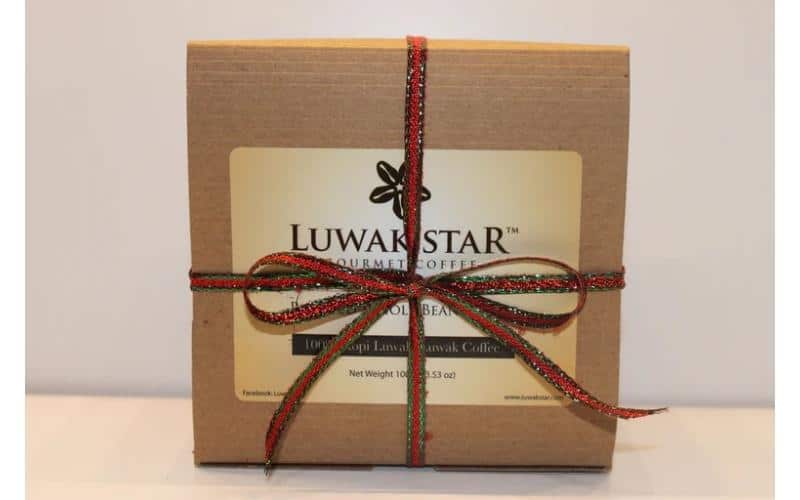
Kopi Luwak coffee saw a massive uptick in popularity after the 2007 film The Bucket List hit theaters. But this popularity had an unintended side effect—an increase in unethical civet farms throughout Java and Indonesia.
This led to a brief backlash against Kopi Luwak, but sustainable and ethical practices soon helped it become an in-demand product once again. And with this bounce back of demand comes higher prices.
Though you can find some Luwak Star Gourmet Coffee varieties available for as little as $240 per pound, some (like the Sumatra Gayo Luwak Coffee) can sell for up to about $471 per pound! Fortunately, this Kopi Luwak coffee is made ethically, as only free-range civets are used to produce the distinct coffee fruit clumps.
Kopi Luwak coffee is naturally sweeter than traditional arabica bean coffees. However, you can make this coffee a little sweeter (and pricier) by adding a teaspoon of the world’s most expensive honey!
Why It’s Expensive
This coffee is expensive due to labor costs, importation fees, and scarcity. Luwak Star Gourmet Coffee is only produced in small batches, and each batch requires a back-breaking amount of labor to create.
Because civets, the animals responsible for making this unique coffee, are only indigenous to Southeast Asia, this coffee incurs hefty importation fees that help make it pricier than homegrown coffees.
3. Cafés Granell Wild Kopi Luwak Coffee – $1,100 Per Pound
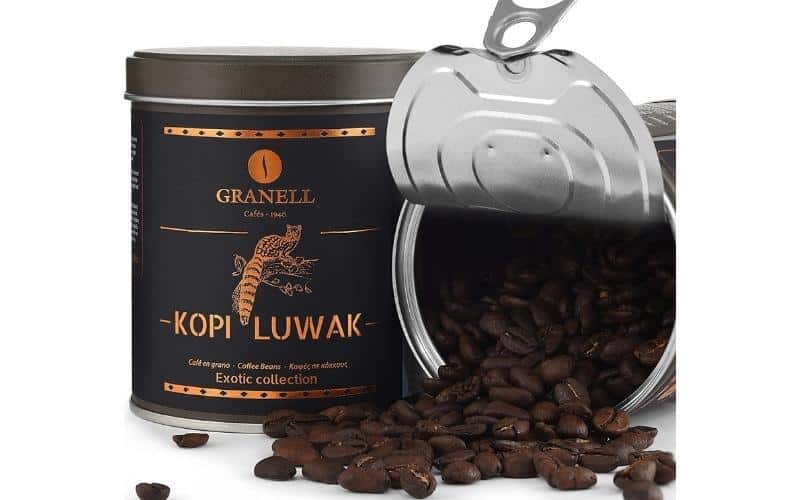
As you’ve likely noticed, several of the most expensive coffees are Kopi Luwak varieties made from partially-digested coffee fruits eaten by civets. But the costliest type of Kopi Luwak money can buy is Cafés Granell Wild Kopi Luwak Coffee, priced at a staggering $1,100 per pound.
Like other gourmet Kopi Luwak coffees, this version is ethically sourced from uncaged civets. While this production method is far more animal-friendly than others, it does increase costs.
Why It’s Expensive
This Kopi Luwak coffee is expensive because it’s created from free-range civets. Using non-caged civets to produce Kopi Luwak coffee is a laborious task, so the “manufacturing” costs are much higher than average.
Still, the primary reason behind this particular brand of Kopi Luwak coffee’s high price might be brand recognition and product quality. These dark brown beans are far more attractive than fruit-filled clusters often advertised as Kopi Luwak.
Besides, Cafés Granell has been producing high-quality coffee for the better half of the last century, making them a trustworthy and well-established brand. This allows them to charge higher prices for their luxury-grade coffees.
2. Ospina Dynasty – $1,431 Per Pound
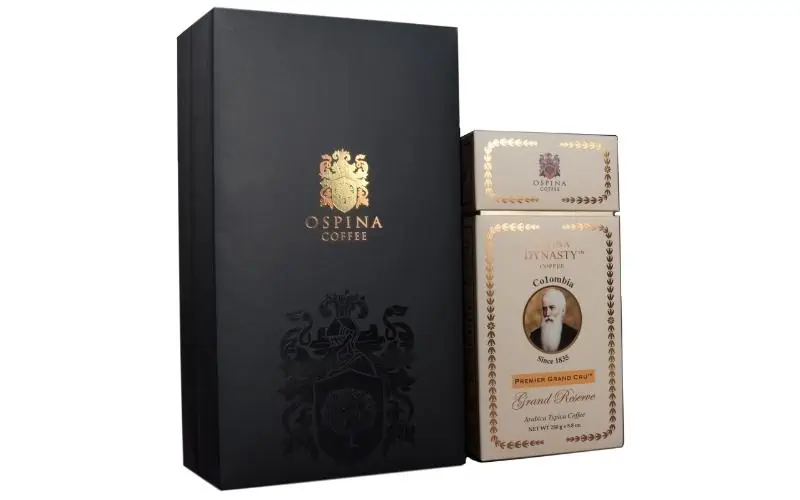
If you’ve got almost $1,500 to spend on a decadent type of coffee, why not try Ospina Dynasty? Though this coffee costs $1,431 per pound, it’s lauded as one of the most exquisite coffees ever produced, making it a must-try for any coffee lover.
This arabica coffee is purported to have the smoothest texture of any coffee in the world, and its tasting notes include chocolate, macadamia nuts, and fruit. Ospina Dynasty is far removed from the tannin-rich bitter coffees found in most hotels and kitchens.
Besides, this coffee arrives in an extravagant case and box, looking more like a rare box of cigars than a container of coffee. Thanks to the exquisite packaging, this coffee could be the ideal gift for the coffee-lover in your life.
Why It’s Expensive
This coffee is expensive because it consists of high-quality whole beans, has a unique flavor profile, and arrives in an austere package that will appeal to gourmands of every type.
1. Black Ivory – $1,685 Per Pound
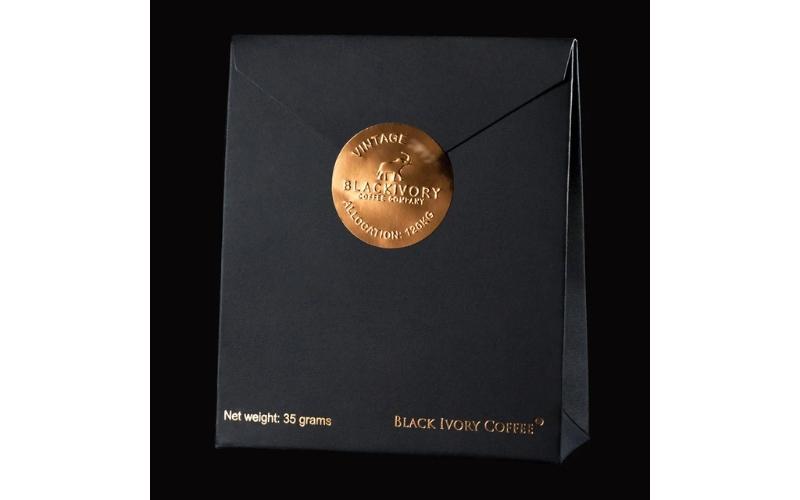
The most expensive coffee ever is Black Ivory Coffee, a Thai arabica blend produced from partially-digested coffee fruits.
A single package of Black Ivory Coffee costs $130 and contains only 35 grams (around 0.08lbs). Consequently, this elephant-friendly Thai coffee costs about $1,685 per pound!
Still, you could enjoy a luxury-grade coffee that’s typically only found in the world’s most extravagant and top-rated hotels and restaurants for that incredible price. Black Ivory Coffee is often described as having a unique flavor with chocolate, fruit, and tobacco notes.
Like Kopi Luwak, this coffee’s bitterness is diminished thanks to its unique refinement process. But instead of being fed to civets, the coffee fruit used to create Black Ivory Coffee is fed to Thai elephants!
So, if the idea of drinking coffee made (in part) from elephant dung turns you off, this expensive coffee might not be the right choice. That said, there are plenty of reasons to invest in this distinct bag of beans.
Why It’s Expensive
Black Ivory Coffee is a gourmet option that’s well-deserving of its incredible price tag. Firstly, Black Ivory Coffee is a small business in rural Thailand, setting it apart from massive corporate coffee companies operating across multiple countries.
Secondly, this coffee maker only utilizes the highest-quality arabica coffee cherries, resulting in a high-quality product. They also work with native Thai elephants and are a notable supporter of the Golden Triangle Asian Elephant Foundation.
Instead of hiring foreign workers to tend coffee fields and care for the elephants used to make this coffee, Black Ivory works directly with local communities to provide financial support and raise employment levels. As such, Black Ivory Coffee may be a more ethical choice than Kopi Luwak varieties.
After all, the employees who care for Black Ivory Coffee elephants ensure that the majestic animals enjoy a nutrient-rich diet that doesn’t solely consist of coffee cherries. The same cannot be said of all Kopi Luwak coffee producers.
All-in-all, this coffee is expensive because it’s:
- Created via a unique refinement method (elephants)
- Free of bitter flavors
- Dedicated to quality over quantity
- Profits help fund local community improvements
Why Are Some Coffees So Expensive?
The average home-brewed cup of coffee only costs a few cents, but some cups are far pricier. But why is there such a dramatic price difference between coffees?
Most of the world’s most expensive coffee types benefit from three qualities:
- Unique refinement processes
- Supply and demand
- Coffee points
If you’re determined to select a gourmet coffee for your collection, you’ll want to familiarize yourself with these qualities. Doing so can also help you understand why some coffees are so much pricier than others!
Unique Refinement Processes
Several of the world’s most expensive coffees enjoy a unique refinement process that differentiates them from other coffees. Black Ivory Coffee and Kopi Luwak are two excellent examples, as both are produced via non-traditional means.
Black Ivory is produced by feeding ripe coffee fruit to elephants, which then partially digest the fruits and pass them in their stool. These partially-digested fruits are picked from the dung, washed, and sun-dried. They’re then ready for brewing!
Kopi Luwak is similar, but it’s produced via civet digestion.
However, the thought of consuming coffee that once sat inside feces can repel some coffee drinkers, this unique method of removing tannins (bitter compounds found in coffee and wine) results in a smooth, high-quality cup of joe that could rival other gourmet options.
As you might imagine, coffees with animal-related refinement processes take far longer to create than coffees made via more traditional means. Consequently, these unique coffees are often made in small batches, making them far rarer than other types of coffee.
Supply and Demand
Like the most expensive teas, supply and demand significantly affect coffee prices.
So, you can make hundreds of cups of coffee at home for only about $20 if you’re buying a common brand like Folgers or Maxwell House. But if you invest in a rare gourmet coffee, you might only get about 30 cups out of a thousand-dollar bag.
In short, commonly available coffees are typically far more budget-friendly than those produced in small quantities, and many of the most expensive coffees are made in extremely limited batches.
But unique refinement processes and scarcity aren’t the only factors influencing coffee value. The coffee’s rating can also impact pricing.
Coffee Points
Did you know that there’s an international rating system for coffee?
This rating system (called The Q System) consists of points, and only the finest coffees are capable of earning 90+ points. Coffee drinkers who are serious about only enjoying the best cups of joe tend to rely on this system to choose high-grade coffees.
But this system not only guides consumer purchasing decisions. It also affects prices!
After all, if a coffee earns a stellar number of points, it’s instantly more attractive to wealthy buyers or dedicated coffee connoisseurs. As such, producers can charge much higher prices for their coffee, knowing that the rating will continue to keep their sales high.
Naturally, consumer reviews also impact coffee prices. Rare gourmet coffee might boast a high price upon its release but then see a dramatic price decrease if consumers don’t enjoy it. As such, reviews can be just as impactful as coffee ratings.
So, if you’re looking for a gourmet coffee to start your day or perk up your lunch, you’ll want to keep an eye out for rating points and aim to purchase coffees with ratings of 90 or higher. You’ll also want to peruse consumer reviews to ensure your chosen coffee suits your preferences and tastes.
What’s the Most Expensive Coffee?
The most expensive coffee of all time is Black Ivory, a rare type of coffee produced in small batches in Thailand. The refinement process of this coffee is one of the primary reasons behind its incredible price.
The fruit of arabica coffee plants (often called coffee cherries) are fed to local elephants, which then digest these bright red fruits. These partially-digested coffee cherries are then separated from the remaining fecal matter, washed, dried, and prepared for shipment.
Are you curious to learn more about the world’s most expensive foods and beverages? Check out these related articles!

